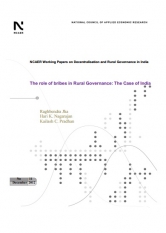The role of bribes in rural governance: The Case of India
Kailash Chander Pradhan
Hari K. Nagarajan
Raghbendra Jha
December 2012
Given that the phenomenon of capture of public programs by sections the population is rampant in developing countries, households can indulge in a strategy to improve their participating in public programs by bribing the suppliers of such programs. This is an important issue affecting both the supply of local public goods and the incidence of corruption. To the best of our knowledge there is no analysis of the impact of bribery on participating in a local public goods program, anywhere. Using a unique data set for rural India this paper addresses the question of whether households bribe elected officials responsible for assuring such supply to improve their access to local public goods. We find considerable evidence of such bribing. We also model the welfare effects of such bribing on groups of households as well as the impact of bribery on aggregate welfare. Several policy conclusions are advanced.
States, Sectors, Surveys, and Impact Evaluation
Agriculture and Rural Development







